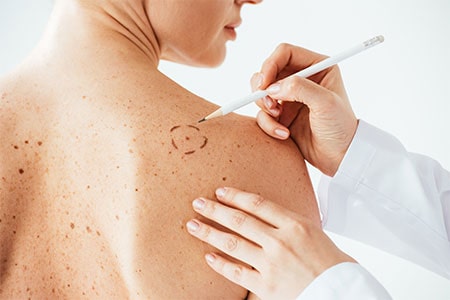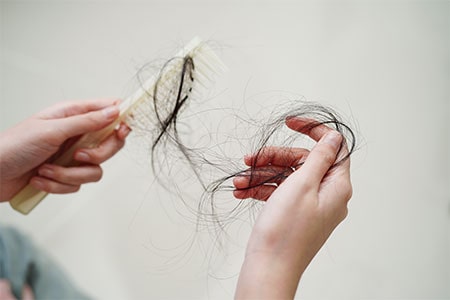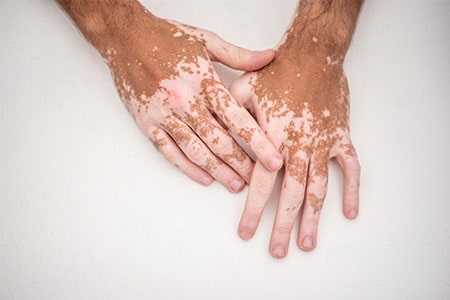General Dermatology
From skin cancer screenings to treatments for hair loss, eczema, acne, and more, our board certified dermatologists treat conditions affecting your skin, hair, and nails. We diagnose a wide range of skin conditions each day and work with you to select treatment options that best fit you and your skin.
Below are some of the many skin conditions that we diagnose and treat as well as general dermatology services we offer. If you have any skin concerns, please contact our office to schedule an appointment with one of our highly trained providers.
- Acne
- Disorders of the Mucous Membranes
- Eczema (Atopic Dermatitis)
- Hair Loss and Scalp Disorders
- Nail Diseases
- Pigmentation Disorders
- Psoriasis
- Rosacea
- Skin Cancer Screening
- Sweating Disorders
Acne
 Acne is a very common skin condition in which hair follicles under the skin becomes clogged with skin oils and dead skin cells and become lesions commonly called pimples or zits, which are often characterized by swelling, redness, and pain. The majority of these outbreaks are found on the face, though they can occur on the neck, back, chest, and shoulders as well.
Acne is a very common skin condition in which hair follicles under the skin becomes clogged with skin oils and dead skin cells and become lesions commonly called pimples or zits, which are often characterized by swelling, redness, and pain. The majority of these outbreaks are found on the face, though they can occur on the neck, back, chest, and shoulders as well.
Anyone, regardless of age and race, can develop acne, though acne most frequently occurs in teenagers and young adults. For most people, acne resolves by the time they reach their thirties, though it is not uncommon for individuals to still have acne in their forties or fifties.
Our board certified dermatologists and highly trained skincare providers will work with you to understand the type of acne you have as well as learn about your overall health, family history, and lifestyle in order to come up with a treatment plan that works for you and your skin.
Skin Cancer Screening
 Skin cancer is the most common cancer in the US. Regular skin exams are an important part of preventative healthcare, particularly for those individuals who may be at higher risk for skin cancer. Our highly trained dermatologists will examine all parts of your skin for any irregularities, especially in those areas that may be difficult for you to see yourself, such as the scalp, back, behind the ears, and, if you have any concerns about the area, the genitalia.
Skin cancer is the most common cancer in the US. Regular skin exams are an important part of preventative healthcare, particularly for those individuals who may be at higher risk for skin cancer. Our highly trained dermatologists will examine all parts of your skin for any irregularities, especially in those areas that may be difficult for you to see yourself, such as the scalp, back, behind the ears, and, if you have any concerns about the area, the genitalia.
Prior to your appointment, perform a self-exam of your skin and make note of any areas you want your dermatologist to examine more carefully. Pay particular attention to any moles that may have changed shape, color, or texture. Take a picture of the spots to show the dermatologist during your appointment.
Some skin conditions that our dermatologists may diagnose and/or biopsy for further examination during a skin check include precancerous spots called actinic keratosis, psoriasis, skin cancers such as basal cell or squamous cell carcinomas or melanoma, eczema, and more.
For those individuals with many moles and who may be at higher risk of developing skin cancer, our office offers mole mapping as a method of early detection of skin cancer.
Disorders of Mucous Membranes
Mucous membrane disorders are diseases of the mucus membranes, or the inner linings, of the mouth, eyes, nose, throat, and genitalia. Often, they are characterized by blistering lesions on the mucous membranes, which can lead to progressive scarring that may cause complications in the eyes, throat and other affected areas of the body.
Some mucous membrane disorders include pemphigus, Behcet disease, Sjogren’s syndrome, and oral lichen planus.
Treatments for these disorders, depending on the diagnosis, include topical/oral corticosteroids, immunosuppressants, and intravenous immunoglobulin antibodies therapy.
Eczema (Atopic Dermatitis)
 Eczema is a common skin condition in which people develop an itchy rash on their skin. Some individuals with eczema may also experience dry patches, skin flaking, bumps, and redness.
Eczema is a common skin condition in which people develop an itchy rash on their skin. Some individuals with eczema may also experience dry patches, skin flaking, bumps, and redness.
Eczema often develops in early childhood and can be more common among people who have a family history of eczema.
Treatment varies depending on the severity of each individual’s eczema and can include simply avoiding skin irritants that trigger eczema flares to topical ointments, steroids, or light therapy.
Hair Loss and Scalp Disorders
 Hair loss can be distressing to anyone who experiences it. The loss of hair can be limited to your scalp or affect the hair on your entire body and can be temporary or permanent, depending on the underlying condition causing the hair loss.
Hair loss can be distressing to anyone who experiences it. The loss of hair can be limited to your scalp or affect the hair on your entire body and can be temporary or permanent, depending on the underlying condition causing the hair loss.
While people typically lose between 50-100 hairs each day, the new growth of hair at the same time replaces the lost hair. However, in those with hair loss, the hairs are not replaced, leading to a patchy, balding appearance of hair on the scalp. Hair loss can be inherited or it can be caused by changes in hormones, autoimmune medical conditions, stress, medication you may be taking, or excessive hairstyling that may apply too much heat or pulling on the scalp.
Other scalp disorders include alopecia areata, psoriasis, and seborrheic dermatitis.
Treatment depends on the causes of the hair loss and can include treating any underlying medical conditions, dietary changes, prescription medications, medicated shampoos or ointments.
Nail Diseases
Your nails serve important aesthetic and protective functions and any changes in your nail’s color, texture, or feel may indicate an underlying condition, such as infection. Some nail conditions that can affect the function of your nail include brittle nail syndrome, nail psoriasis, onychomycosis, and paronychia among many others. It is crucial to have a dermatologist examine your nails when you see or feel any changes so that prompt treatment can begin, especially since some nail symptoms can indicate more serious conditions such as certain skin cancers.
Pigmentation Disorders
 Pigmentation disorders are disturbances in the color of your skin due to a change in the amount of melanin, a sun-protective pigment, in your skin. Depending on the condition, the affected area of skin may have more or less melanocytes, specialized skin cells that produce melanin. Some of the most common pigmentation disorders include vitiligo, melasma, albinism, and post-inflammatory hyperpigmentation.
Pigmentation disorders are disturbances in the color of your skin due to a change in the amount of melanin, a sun-protective pigment, in your skin. Depending on the condition, the affected area of skin may have more or less melanocytes, specialized skin cells that produce melanin. Some of the most common pigmentation disorders include vitiligo, melasma, albinism, and post-inflammatory hyperpigmentation.
Psoriasis
Psoriasis is a chronic, or long-lasting, condition in which your skin cells build up too quickly, leading to scaly skin and dry, itchy patches. While the cause of psoriasis is not fully understood, it is generally thought to be an immune system issue in which your infection-fighting cells target your healthy skin cells by mistake. The most common symptom is a rash on the skin, but psoriasis can affect nails and joints too.
While psoriasis has no cure, there are treatments your dermatologist can prescribe to help provide symptom relief, such as removing scaly skin and preventing skin cells from growing too quickly. Treatments include photodynamic therapy, steroids, anti-inflammatory medications, and biologic medications.
Biologic medications can be life-changing for many patients with psoriasis because they only target the overactive part of your immune system. Because they are powerful medications that can cause serious side effects, our dermatologists will carefully screen you to assess whether biologics are a good fit for you. Screening for biologics includes blood work and tuberculosis tests, among others tests.
Rosacea
 Rosacea is a condition mainly affecting the face and causes flushing and long-term redness. The redness is often accompanied by acne-like breakouts, broken blood vessels, and, less often, eye irritation or thickening skin. Rosacea is often mistaken for acne, so it is important to have a dermatologist examine and properly diagnose it to ensure you receive the appropriate treatment.
Rosacea is a condition mainly affecting the face and causes flushing and long-term redness. The redness is often accompanied by acne-like breakouts, broken blood vessels, and, less often, eye irritation or thickening skin. Rosacea is often mistaken for acne, so it is important to have a dermatologist examine and properly diagnose it to ensure you receive the appropriate treatment.
Rosacea does not have a cure, but treatment can reduce rosacea symptoms and prevent your rosacea from worsening over time. Common treatments include topical medications, intense pulsed light (IPL) therapy, antibiotics for the acne-like breakouts, and identifying and limiting any triggers of your rosacea, such as stress, food, and other environmental factors. Our dermatologists will work with you to come up with the best treatment, or combination of treatments, for your rosacea.
Sweating Disorders
Some individuals may experience sweating even when it is not hot or they have not been exercising. They may experience excessive sweating all over their body or in a few concentrated areas. This level of sweating may indicate an underlying disorder. Our dermatologists can examine you to determine what may be causing your excessive sweating and prescribe treatment options to help address the issue.
Some conditions that cause excessive sweating include hyperhidrosis, diabetes, and hyperthyroidism, among others.
